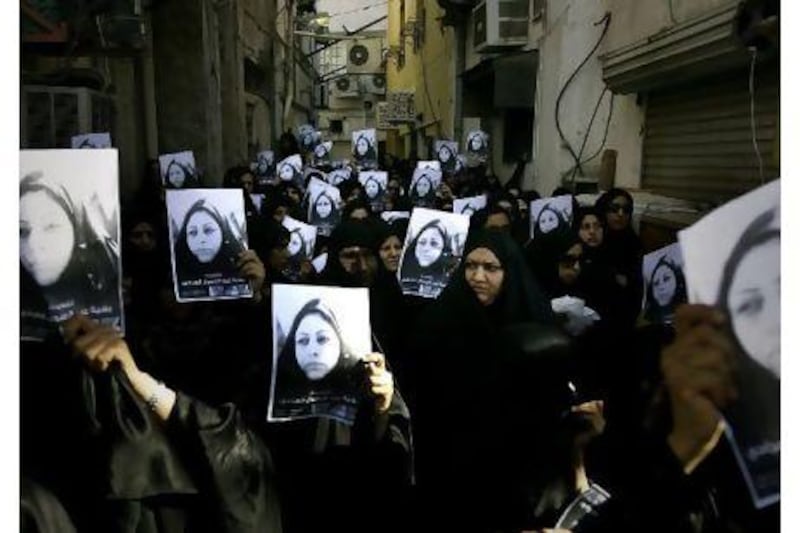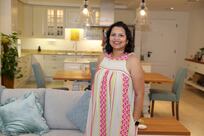MANAMA // Some sat quietly crying. Others wailed and cursed the government, which they hold responsible for the death of the 51-year-old woman who was shot in the head a week ago. Bahiya Al Aradi's sister Umm Mahmoud urged the women not to cry.
"She is the first shaheeda [female martyr]," she told the mourners. "Don't cry."
Al Aradi had not been involved in the pro-democracy demonstrations that began over a month ago in Bahrain, before the violent clampdown when security forces stormed Pearl Roundabout, killing three and wounding many more.
An estimated 25 people, including at least 15 Shia Bahrainis, have been killed since unrest broke out in the island kingdom on February 14. Opposition groups say around 100 people are still unaccounted for.
The government announced a state of emergency last week, shortly before the arrival of the Peninsula Shield Force, led by Saudi Arabia and including UAE police.
On Wednesday afternoon, al Aradi was en route from her elderly mother's home in central Manama to the home of her best friend of 40 years, a woman who would agree to be identified only by the name Salwa.
After the violent events of the morning, there was a heavy police and military presence on the roads as al Aradi drove Salwa's car from Manama towards the area of Budaiya.
A drive that would normally take 20 minutes ended up taking hours, as she was stopped by multiple military checkpoints.
Umm Mahmoud said her sister was rerouted several times, struggled to find petrol and became increasingly alarmed about driving in the dark with armed soldiers on the streets.
As she was driving through the village of Qadam, al Aradi was on the phone to one of her sisters, who suddenly heard what sounded like shots being fired on the other end of the line.
"My sister heard Bahia scream," said Umm Mahmoud, 37, in the family home's majlis in Manama. "My sister called me and said 'Maybe she's dead'."
Three days later, the al Aradi family were informed that she was at the Bahrain Defence Force Hospital. After several unsuccessful attempts to enter the facility, Habib al Aradi, her brother, was finally given access and found his elder sister hooked up to life-support.
On Monday night, the family were told that she had passed away.
There has been no comment from the government about al Aradi's death, but the official death certificate issued to the family yesterday said she died from the "shock" of a "severe brain injury".
By yesterday, a wound in the back of her head had been stitched up, making it difficult to determine the exact entry point of the bullet.
An Indian worker is also believed to have died from a gunshot wound on Wednesday night, in an area close to where al Aradi was shot.
"She was never married, everybody loved her," said Umm Mahmoud, her sister. "We are happy. We are not afraid. Bahia is the first female martyr."
Other relatives and friends, including one of her female cousins, said they wanted some answers.
"There is a big pain in your heart because you can't do anything," she said. "We just need to stop this. I want to know why she was killed. For what?"
Al Aradi's cousin rejected accusations of Iranian involvement in the events of the last month.
"It's not about Iran. It's about houses and poor Bahrainis who just want to eat," she said. "It's about our future for our kids and families. Please stop killing the people."
Al Aradi split her time between her mother's house in central Manama and her friend Salwa's family home. The two had been friends since they were children, Salwa explained, standing just outside the room in the mosque compound where al Aradi's body was being washed by a group of women, who recited prayers in preparation for her burial.
"She was more than a sister to me. I can't describe how I feel, but my children are making me strong," she said, shortly before Al Aradi's coffin was carried out, as the gathered women wailed and shouted "Allah uh Akhbar".
By the early afternoon, the numbers had grown with thousands turning out for the funeral procession in the central Manama neighbourhood where she grew up.
Salwa's son Hussein, 14, hung from the side of the four-wheel-drive vehicle carrying al Aradi's coffin as it made its way from a mosque near the family home towards the cemetery, surrounded by people who knew her, and many who did not.
"I am so sad because she was alone in her car and she didn't do anything wrong," said Bushra, a 25-year-old who came from the island of Sitra for the funeral.
"For men to die, yes we expect this - this is the cost of change. But a woman [being killed], I never expected this."





